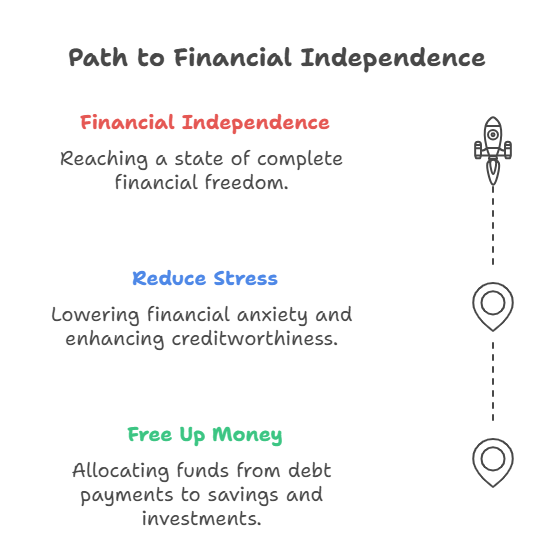
Introduction
What does financial freedom in 2025 really mean? It’s not just about making more money—it’s about having control over your finances, the ability to live on your own terms, and the security to handle life’s uncertainties without stress. Financial freedom means no longer living paycheck to paycheck, being free from crippling debt, and having enough savings and investments to support your lifestyle.
As we move into 2025, achieving financial independence is more important than ever. With rising inflation, economic uncertainty, and the increasing cost of living, those who take intentional steps now will be in a far better position than those who wait.
However, financial freedom doesn’t happen overnight—it requires discipline, strategy, and long-term planning.
This guide will walk you through five essential steps to financial freedom in 2025:
1️⃣ Create and Stick to a Budget – The foundation of financial success starts with knowing where your money goes and controlling your spending.
2️⃣ Build an Emergency Fund – Having savings set aside protects you from financial disasters and unexpected expenses.
3️⃣ Strategically Pay Off Debt – High-interest debt, especially credit card debt, can keep you from building wealth. Eliminating it is key.
4️⃣ Invest for the Future – Investing wisely helps you grow your money and work towards long-term financial security.
5️⃣ Continuously Educate Yourself – Financial literacy is the secret weapon to staying ahead and making smarter money decisions.
By implementing these steps with consistency and commitment, you’ll be on the path to achieving true financial independence in 2025 and beyond.
1. Create and Stick to a Budget
Why Budgeting is the Foundation of Financial Freedom
A budget is more than just tracking your income and expenses—it’s a roadmap to financial success. Without a budget, it’s easy to overspend, accumulate debt, and miss saving opportunities.
When you take control of your finances, you can prioritize financial goals like debt repayment, investing, and wealth-building.
A well-planned budget allows you to:
✅ Know exactly where your money is going each month.
✅ Avoid unnecessary spending and redirect funds toward important financial goals.
✅ Ensure you are saving enough for emergencies and future investments.
Steps to Building a Realistic Budget
1. Track Your Income and Expenses
- List all sources of income, including salary, side hustles, and passive income.
- Categorize fixed expenses (rent, utilities, insurance) and variable expenses (groceries, entertainment, shopping).
- Identify areas where spending is excessive or unnecessary.
2. Use Budgeting Apps for Easier Financial Management
Technology makes budgeting simple and automated. Consider using:
📲 Mint – Tracks spending and categorizes expenses.
📲 You Need a Budget (YNAB) – Helps you allocate every dollar for a purpose.
📲 EveryDollar – Ideal for zero-based budgeting.
📲 Personal Capital – Great for tracking expenses and investments.
3. Identify Unnecessary Spending and Cost-Cutting Opportunities
- Review past bank statements to spot patterns in unnecessary purchases.
- Cancel unused subscriptions (streaming services, gym memberships).
- Reduce eating out and opt for home-cooked meals.
- Shop smarter—use discounts, cashback apps, and bulk purchases.
4. Adjust Your Budget Over Time
A budget isn’t set in stone—it should evolve as your financial situation changes.
🔹 Increase savings contributions as your income grows.
🔹 Reallocate funds if new expenses arise.
🔹 Reevaluate spending habits every 3-6 months to stay on track.
Final Thought on Budgeting
Budgeting isn’t about restricting your life—it’s about taking control of your money so you can spend it on things that matter most. A well-planned budget is your first step toward financial freedom in 2025!
2. Build an Emergency Fund
The Role of an Emergency Fund in Financial Security
Life is unpredictable. Unexpected expenses—like medical bills, car repairs, or job loss—can derail financial stability if you’re not prepared. An emergency fund acts as a financial safety net, allowing you to handle setbacks without falling into debt.
Having an emergency fund means you won’t need to:
🚫 Rely on credit cards with high-interest rates.
🚫 Take out expensive payday loans.
🚫 Sell off investments at a loss during financial crises.
How Much Should You Save?
🔹 Minimum Goal: $1,000 for small emergencies.
🔹 Ideal Goal: 3-6 months’ worth of living expenses stored in an accessible account.
🔹 For Extra Security: 9-12 months’ expenses if you are self-employed or have variable income.
Where to Store Your Emergency Fund
Your emergency fund should be:
✅ Easily accessible (but not too easy to spend).
✅ Separate from daily spending accounts.
✅ Low risk (no investments—emergency funds should be stable).
Best places to store your emergency fund:
🏦 High-Yield Savings Account – Earns more interest than a regular savings account.
🏦 Money Market Account – Offers easy access with better interest rates.
🏦 Online Banks – Often provide higher interest rates and lower fees than traditional banks.
How to Start Small and Build Consistently
💰 Start with small deposits – Even $25-$50 per paycheck adds up over time.
💰 Automate savings – Set up automatic transfers to your emergency fund.
💰 Use windfalls wisely – Tax refunds, bonuses, and side hustle income can boost your savings.
💰 Cut unnecessary expenses – Redirect money from non-essential spending into savings.
Final Thought on Emergency Funds
An emergency fund isn’t just about saving money—it’s about protecting your financial future. The sooner you start, the more secure your path to financial freedom in 2025 will be.
3. Strategically Pay Off Debt
How High-Interest Debt Prevents Financial Freedom
Debt is one of the biggest obstacles to achieving financial freedom. Carrying high-interest debt—especially from credit cards, payday loans, or personal loans—can drain your income, leaving little room for saving and investing. The longer you carry debt, the more you pay in interest, which keeps you stuck in a financial cycle instead of progressing toward independence.

By strategically paying off debt, you can:
✅ Free up more money for savings and investments.
✅ Reduce financial stress and improve your credit score.
✅ Achieve true financial independence faster.
Methods to Tackle Debt Effectively
There are two popular strategies for debt repayment, both designed to help you eliminate debt efficiently.
1. The Debt Avalanche Method (Paying Off High-Interest Debts First)
🔹 Focus on paying off the debt with the highest interest rate first while making minimum payments on all other debts.
🔹 Once the highest-interest debt is paid off, move to the next highest.
🔹 This method saves you the most money in interest over time.
Best for: Those who want to pay less in total interest and get out of debt faster.
2. The Debt Snowball Method (Paying Off Smallest Debts First for Quick Wins)
🔹 Focus on paying off the smallest debt first, regardless of interest rate, while making minimum payments on larger debts.
🔹 Once the smallest debt is eliminated, move to the next smallest.
🔹 This method provides quick wins, keeping you motivated.
Best for: Those who need motivation and momentum to stay consistent with debt repayment.
The Benefits of Debt Consolidation to Simplify Payments
Debt consolidation involves combining multiple debts into a single loan with a lower interest rate. This makes repayment easier and reduces the total interest paid over time.
✅ Lower interest rates compared to credit cards.
✅ One fixed monthly payment instead of multiple bills.
✅ Faster debt payoff with structured repayment terms.
Options for debt consolidation:
📌 Balance transfer credit cards – If you qualify for a 0% APR introductory period.
📌 Debt consolidation loans – Fixed-rate personal loans with structured payments.
📌 Home equity loans – Using your home’s equity to consolidate high-interest debt (only for those with stable finances).
How to Avoid Accumulating New Debt While Repaying Old Ones
To stay debt-free once you start paying off balances:
🚫 Stop relying on credit cards for everyday purchases.
🚫 Create a cash flow buffer to avoid borrowing money.
🚫 Use your budget to track spending and prevent overspending.
🚫 Build an emergency fund to handle unexpected expenses.
By taking a strategic approach to debt repayment, you can eliminate financial burdens and move closer to financial freedom in 2025.
4. Invest for the Future
The Importance of Investing for Wealth-Building and Retirement
Saving alone is not enough to achieve financial freedom—you must invest to grow wealth over time. Inflation decreases the value of cash sitting in a savings account, while investing allows your money to grow and work for you.
Investing helps you:
✅ Build long-term wealth and financial independence.
✅ Ensure a comfortable retirement without relying on Social Security alone.
✅ Protect against inflation and increase your net worth.
Investment Strategies for 2025
To build a strong financial future, it’s important to diversify your investments and take advantage of long-term growth opportunities.
1. Contributing to 401(k)s and IRAs
- 401(k) Plans: If your employer offers a 401(k), contribute enough to get the full company match (this is free money!).
- Traditional IRA: Tax-deferred growth; contributions are tax-deductible.
- Roth IRA: Tax-free withdrawals in retirement; ideal for long-term wealth-building.
Pro tip: Max out contributions if possible ($23,000 for 401(k)s and $7,000 for IRAs in 2025).
2. Diversifying Investments Across Stocks, Bonds, and Real Estate
📈 Stocks – High growth potential but comes with risk. Best for long-term investing.
📉 Bonds – Lower risk, stable returns; provides balance in your portfolio.
🏡 Real Estate – Rental properties generate passive income and appreciate over time.
🪙 Index Funds & ETFs – Diversified, low-cost investments that track the market’s performance.
Diversification ensures that if one investment underperforms, others can compensate, reducing overall risk.
3. Understanding Risk Tolerance and Long-Term Investment Planning
- Risk tolerance refers to how much financial risk you can handle.
- Younger investors can take more risks with stocks since they have time to recover.
- As you get older, shift to safer investments like bonds and dividend stocks.
Why Working with a Financial Advisor Can Enhance Your Investment Strategy
A professional financial advisor can:
✅ Help you create a personalized investment plan based on your goals.
✅ Optimize your tax strategy to keep more of your investment earnings.
✅ Guide you through market fluctuations to avoid emotional decision-making.
Final Thought on Investing
Investing is one of the most powerful tools for achieving financial freedom. The sooner you start, the more wealth you can accumulate over time. A smart investment strategy in 2025 can set you up for a lifetime of financial security and independence.

5. Continuously Educate Yourself
The Power of Financial Literacy in Achieving Financial Freedom
Financial freedom isn’t just about how much money you make—it’s about how well you manage and grow your money. The key to long-term wealth and financial security lies in financial literacy—the ability to understand, plan, and make informed decisions about money.
Many people fall into debt, make poor investments, or fail to build wealth because they lack financial knowledge. Educating yourself about personal finance empowers you to take control of your financial future, avoid common pitfalls, and make smarter decisions that align with your goals.
Ways to Stay Informed About Personal Finance
To build long-term wealth, you must commit to continuous learning. Here are some ways to stay financially educated:
1. Read Financial Books and Blogs
- Books like Rich Dad Poor Dad by Robert Kiyosaki and The Total Money Makeover by Dave Ramsey offer practical financial wisdom.
- Follow financial blogs such as NerdWallet, Investopedia, and The Motley Fool for up-to-date financial advice.
- Read success stories from financially independent individuals to learn strategies that work.
2. Attend Workshops and Financial Planning Courses
- Look for local or online personal finance workshops that cover topics like budgeting, investing, and debt management.
- Platforms like Coursera, Udemy, and Khan Academy offer affordable or free courses on financial literacy.
- Many banks and credit unions offer free financial education programs—take advantage of them!
3. Follow Reputable Finance Experts and Platforms
- Follow trusted finance influencers like Dave Ramsey, Suze Orman, or Robert Kiyosaki for wealth-building tips.
- Subscribe to financial podcasts and YouTube channels that break down personal finance topics in easy-to-understand ways.
- Engage with finance-focused social media accounts—but be cautious of get-rich-quick schemes and misleading investment advice.
How Updating Your Financial Plan Regularly Ensures Long-Term Success
Your financial goals, income, and life circumstances will change over time, so your financial plan should evolve too.
🔹 Review your budget and adjust expenses as needed.
🔹 Reassess your savings and investment strategies annually.
🔹 Update financial goals based on career changes, family planning, or economic shifts.
🔹 Stay ahead of financial trends to make informed decisions about new opportunities.
By making financial education a lifelong habit, you ensure that you’re always making smart, informed financial choices—which is the true foundation of lasting financial freedom.
Conclusion
The Five Steps to Financial Freedom in 2025
Reaching financial independence isn’t just a dream—it’s an achievable goal when you follow a strategic plan. Let’s recap the five essential steps to financial freedom in 2025:
1️⃣ Create and Stick to a Budget – Managing your money starts with tracking income, controlling expenses, and setting financial priorities.
2️⃣ Build an Emergency Fund – Financial security comes from having a safety net to cover unexpected expenses.
3️⃣ Strategically Pay Off Debt – Eliminating high-interest debt frees up money for saving and investing.
4️⃣ Invest for the Future – Smart investments in stocks, real estate, and retirement accounts ensure long-term wealth growth.
5️⃣ Continuously Educate Yourself – The more you learn about money, the better financial decisions you can make.
The Importance of Patience, Discipline, and Consistency
Financial freedom is not an overnight process—it requires:
✔ Patience – Wealth-building takes time, discipline, and smart financial decisions.
✔ Discipline – Sticking to a budget, paying off debt, and investing regularly leads to long-term success.
✔ Consistency – Staying committed to good financial habits will make the biggest difference in achieving financial independence.
Take Immediate Action Today!
The best time to start your financial journey is right now.
✅ Begin by creating a budget and tracking your expenses.
✅ Start saving—even if it’s just $20 a week—toward your emergency fund.
✅ Make a plan to pay down debt strategically.
✅ Begin investing for your future with retirement accounts and diversified assets.
✅ Commit to continuous financial education to stay ahead in your wealth-building journey.
Final Motivation: You Can Achieve Financial Freedom in 2025!
Financial freedom is within your reach—all it takes is the right mindset, smart money decisions, and consistent action. Whether you’re starting from zero or refining your financial habits, every step you take today brings you closer to financial independence tomorrow.
🚀 Your future self will thank you for the decisions you make today—so take charge, commit to your goals, and make 2025 the year you step into financial freedom! 🚀
